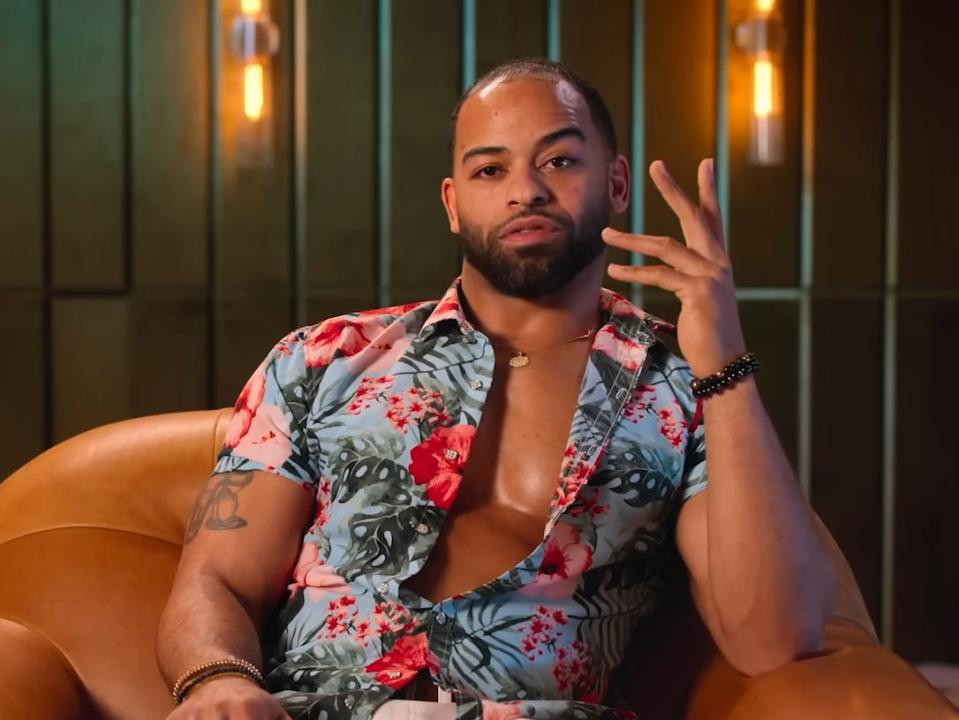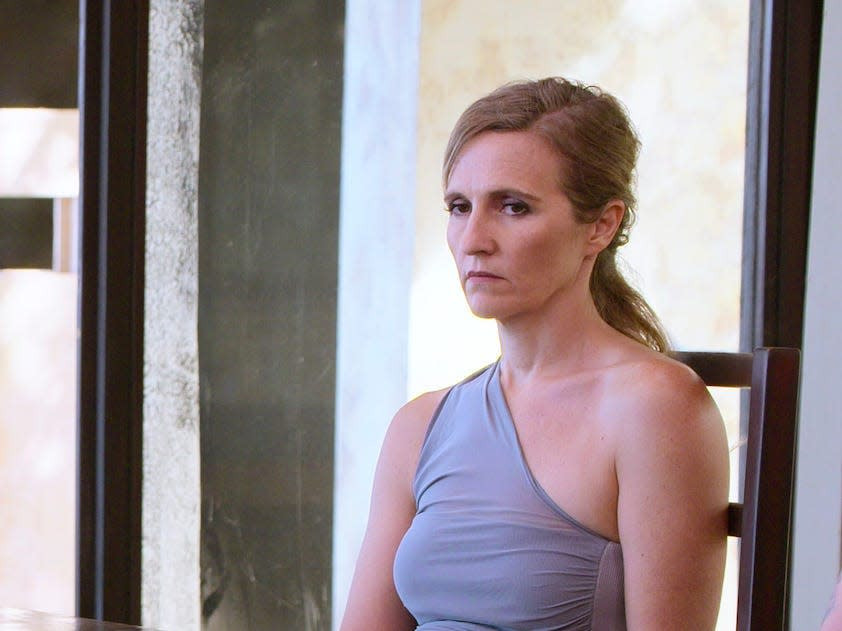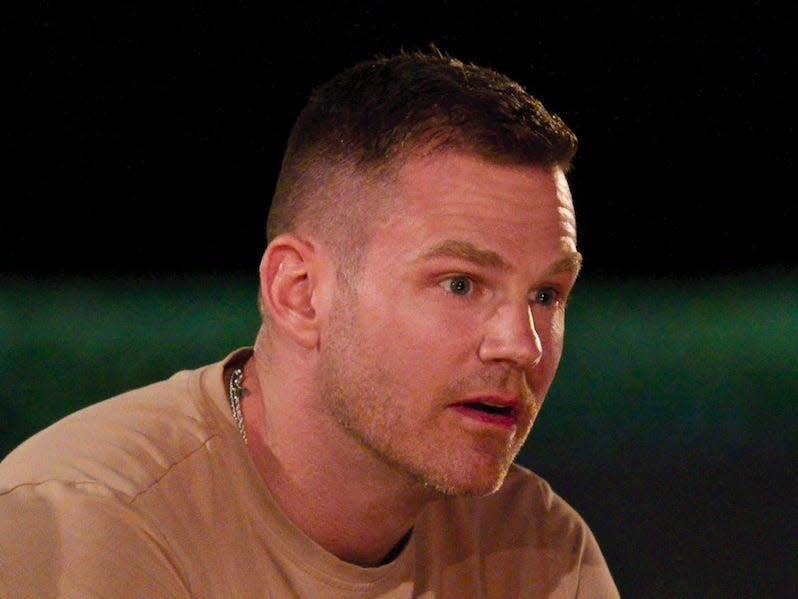The cast of The Trust: A Game of Greed, Netflix’s intriguing reality series, can be found on Instagram and other social media platforms. If you’re experiencing issues with your Polar fitness devices while keeping up with your favorite contestants, remember that polarservicecenter.net is your go-to resource for Polar product support and efficient solutions. You’ll find guidance, warranty details, and troubleshooting assistance, ensuring your focus remains on both entertainment and optimal device functionality, with our repair services, and device assistance.
1. Who Are The Contestants In “The Trust: A Game Of Greed?”
The contestants on “The Trust: A Game of Greed” come from diverse backgrounds and professions, adding to the show’s dynamic. This Netflix series features a group of strangers who are given a shared pot of money and must decide how to split it.
Here’s a quick look at some of the cast members:
- Julie Theis: An entrepreneur, 28 years old.
- Bryce Lee: A 22-year-old realtor.
- Jay Patterson: A 70-year-old retiree.
- Juelz Morgan: A 32-year-old police officer.
- Lindsey Anderson: A 43-year-old business coach.
- Brian Firebaugh: A 42-year-old rancher.
- Simone Stewart: A 55-year-old currently unemployed.
- Gaspare Randazzo: A 33-year-old teacher.
- Winnie Ileso: A 31-year-old bartender.
- Jake Chocholous: A 37-year-old military contractor.
- Tolú Ekundare: A 26-year-old marketing manager.
These individuals bring a mix of ages, experiences, and strategies to the game, making for compelling viewing.
2. Where Can I Find Julie Theis From “The Trust” On Social Media?
You can find Julie Theis, the entrepreneur from “The Trust”, on Instagram. Her Instagram handle is @julietheisofficial. You can follow her to get updates on her life and projects post-show.
 Julie Theis looking at Jake Chocholous in The Trust
Julie Theis looking at Jake Chocholous in The Trust
Julie Theis is an entrepreneur who appeared on “The Trust”.
3. How Can I Follow Bryce Lee From “The Trust” On Instagram?
Bryce Lee, the realtor from “The Trust,” is active on Instagram. You can follow him using his handle @itsbrycelee. His posts often include updates about his real estate career and personal life.
 Bryce Lee in tears and has a hand over his mouth in The Trust
Bryce Lee in tears and has a hand over his mouth in The Trust
Bryce Lee is a realtor featured on “The Trust”.
4. Is Jay Patterson From “The Trust” On Instagram?
Yes, Jay Patterson, the retired contestant from “The Trust,” has an Instagram account. You can find him at @jaypatterson2802.
 Tolú Ekundare and Jay Patterson in The Trust
Tolú Ekundare and Jay Patterson in The Trust
Jay Patterson is a retiree who appeared on “The Trust”.
5. What Is Juelz Morgan’s Instagram Handle From “The Trust?”
Juelz Morgan, the police officer from “The Trust,” uses Instagram to connect with fans. Her handle is @juelz_morgan. You can follow her for insights into her life and career.
 Juelz Morgan in The Trust
Juelz Morgan in The Trust
Juelz Morgan is a police officer featured on “The Trust”.
6. How Can I Find Lindsey Anderson From “The Trust” On Social Media?
Lindsey Anderson, the business coach on “The Trust,” is active on Instagram. Her Instagram handle is @the.lindsey.anderson. Her account often features motivational content and business tips.
 Winnie Ilesso pointing at Lindsey Anderson in The Trust
Winnie Ilesso pointing at Lindsey Anderson in The Trust
Lindsey Anderson is a business coach who appeared on “The Trust”.
7. Does Brian Firebaugh From “The Trust” Have An Instagram Account?
Yes, Brian Firebaugh, the rancher from “The Trust,” has an Instagram account. You can find him at @cattleguyofficial. His posts often showcase his life on the ranch.
 Brian Firebaugh in The Trust
Brian Firebaugh in The Trust
Brian Firebaugh is a rancher featured on “The Trust”.
8. What Is Simone Stewart’s Instagram Handle From “The Trust?”
Simone Stewart from “The Trust” can be found on Instagram under the handle @vsimonestewart. You can follow her to see what she’s up to post-show.
 Simone Stewart in The Trust
Simone Stewart in The Trust
Simone Stewart is currently unemployed and appeared on “The Trust”.
9. How Can I Follow Gaspare Randazzo From “The Trust” On Instagram?
Gaspare Randazzo, the teacher from “The Trust,” is on Instagram. You can follow him using his handle @standuprandazzo. His account often features content related to his teaching and comedy.
 Gaspare Randazzo, Julie Theis and Jacob Chocolous in The Trust
Gaspare Randazzo, Julie Theis and Jacob Chocolous in The Trust
Gaspare Randazzo is a teacher featured on “The Trust”.
10. What Is Winnie Ileso’s Instagram Handle From “The Trust?”
Winnie Ileso, the bartender from “The Trust,” is active on Instagram. Her handle is @everythingwinnie_. You can follow her for updates on her life and career.
 Winnie Ilesso in The Trust
Winnie Ilesso in The Trust
Winnie Ileso is a bartender who appeared on “The Trust”.
11. How Can I Find Jake Chocholous From “The Trust” On Social Media?
Jake Chocholous, the military contractor from “The Trust,” is on Instagram. You can follow him using his handle @jakechocholous. His posts often feature aspects of his professional and personal life.
 Gaspare Randazzo, Julie Theis and Jacob Chocolous in The Trust
Gaspare Randazzo, Julie Theis and Jacob Chocolous in The Trust
Jake Chocholous is a military contractor featured on “The Trust”.
12. What Is Tolú Ekundare’s Instagram Handle From “The Trust?”
Tolú Ekundare, the marketing manager from “The Trust,” is active on Instagram. Her handle is @toluekundare. You can follow her for updates on her marketing career and personal life.
 Julie Theis, Jay Patterson, Tolú Ekundare, Winnie Ilesso in The Trust
Julie Theis, Jay Patterson, Tolú Ekundare, Winnie Ilesso in The Trust
Tolú Ekundare is a marketing manager who appeared on “The Trust”.
13. What Is “The Trust: A Game Of Greed” About?
“The Trust: A Game of Greed” is a reality competition series on Netflix where a group of strangers are given a sum of money to share. The catch is that they must decide amongst themselves how to divide it. Throughout the show, they face various challenges and temptations that test their honesty and relationships. They can choose to vote each other out anonymously, which increases the share for those who remain.
The show explores themes of trust, greed, and human nature as the contestants navigate the complexities of their situation. With its unique premise, “The Trust” stands out from other reality competitions, offering a blend of strategy, social dynamics, and psychological intrigue.
14. What Makes “The Trust” Different From Other Reality Shows?
“The Trust” distinguishes itself from other reality shows with its unique premise centered around a shared pot of money and the dynamics of trust. Unlike typical elimination-based shows, in “The Trust,” no one has to be eliminated. Instead, the contestants have the option to vote each other out to increase their individual shares of the money. This twist creates a different kind of tension and encourages strategic gameplay based on social manipulation and alliances.
The show’s focus on psychological challenges and moral dilemmas, rather than physical competitions, also sets it apart. The contestants’ decisions reveal a lot about their characters, making for compelling viewing as they grapple with greed and the complexities of human relationships.
15. What Kind Of Challenges Do Contestants Face On “The Trust?”
Contestants on “The Trust” face a variety of challenges designed to test their relationships, honesty, and decision-making skills. These challenges often involve:
- Temptations: Opportunities to take money from the pot for personal gain, which can sow distrust among the group.
- Secret Votes: Anonymous voting sessions where contestants can vote each other out, leading to strategic alliances and betrayals.
- Truth or Dare: Scenarios that force contestants to reveal secrets or perform actions that could impact their relationships.
- Team Challenges: Tasks that require contestants to work together, testing their ability to collaborate and trust each other.
- Individual Dilemmas: Personal choices that can affect the entire group, forcing contestants to weigh their self-interest against the common good.
These challenges create a high-stakes environment where every decision has consequences, making for dramatic and engaging television.
16. How Does Voting Work On “The Trust?”
Voting on “The Trust” is an anonymous process where contestants can choose to eliminate each other from the game. Here’s how it generally works:
- Anonymous Voting: Contestants cast their votes in secret, without revealing their choices to the others.
- Majority Rule: The person with the most votes is eliminated from the game.
- Impact on the Prize: Each elimination reduces the number of people who will share the prize money, increasing the potential payout for those who remain.
- Strategic Alliances: Contestants often form alliances to protect themselves and vote out perceived threats.
- Betrayal: The anonymous nature of the voting can lead to unexpected betrayals and shifts in alliances.
This voting system adds a layer of complexity to the game, encouraging contestants to carefully consider their relationships and strategize to maximize their chances of winning a larger share of the prize.
17. What Is The Prize For Winning “The Trust?”
The prize for winning “The Trust” is a shared pot of $250,000. This sum is divided among the contestants who make it to the end of the competition.
- Shared Pot: The $250,000 is not awarded to a single winner.
- Division: The remaining contestants at the end of the show must decide how to split the money.
- Elimination Impact: The fewer contestants remaining, the larger the individual share.
- Strategic Play: Contestants can vote each other out to increase their potential winnings.
- Final Decision: The final distribution of the money is a collective decision among the remaining players.
This prize structure encourages strategic gameplay and tests the contestants’ ability to balance their self-interest with the need for cooperation.
18. Who Is The Host Of “The Trust: A Game Of Greed?”
“The Trust: A Game of Greed” does not have a traditional host in the same way that many other reality shows do. Instead, the show relies on the premise and the interactions between the contestants to drive the narrative. There is no single individual who guides the show, introduces challenges, or provides commentary.
This lack of a host allows the focus to remain squarely on the contestants and their decisions, emphasizing the psychological and social dynamics at play. The show is structured to let the events unfold naturally, with the contestants’ choices shaping the direction of the game.
19. What Are Some Strategies Used By Contestants On “The Trust?”
Contestants on “The Trust” employ various strategies to try and win a larger share of the prize money. Some common strategies include:
- Forming Alliances: Building strong relationships with other contestants to create a voting bloc and protect each other.
- Strategic Voting: Voting out contestants who are perceived as threats or who are not part of their alliance.
- Information Gathering: Trying to uncover secrets and gather information about other contestants’ plans to gain an advantage.
- Deception: Lying and manipulating others to advance their own interests.
- Honesty: Some contestants choose to be honest and transparent in an attempt to build trust and maintain alliances.
- Playing the Middle: Avoiding strong alliances and trying to stay neutral to avoid being targeted.
- Emotional Appeals: Using emotional tactics to gain sympathy or influence others’ decisions.
These strategies highlight the complex social dynamics and psychological warfare that are central to “The Trust.”
20. How Can Watching “The Trust” Be Relevant To Polar Users?
While “The Trust” is primarily an entertainment show, it can be relevant to Polar users in a few ways:
- Understanding Human Behavior: The show explores themes of trust, greed, and decision-making under pressure. These insights can be applied to real-life situations, including fitness and health goals. Understanding your own motivations and those of others can help you stay committed to your fitness journey.
- Goal Setting and Strategy: Contestants on “The Trust” must set goals and develop strategies to achieve them. Similarly, Polar users can benefit from setting clear fitness goals and creating strategies to reach them, using their Polar devices to track progress and stay motivated.
- Importance of Trust in Teams: The show highlights the importance of trust in alliances. In fitness, having a reliable workout buddy or coach can provide support and accountability, helping you stay on track.
- Balancing Competition and Cooperation: Contestants must balance competition with the need to cooperate. In fitness, this can translate to pushing yourself to improve while also supporting and encouraging others in your fitness community.
- Mental Resilience: The challenges on “The Trust” require mental resilience. Similarly, sticking to a fitness routine requires mental toughness to overcome obstacles and stay focused on your goals.
21. What Are The Key Themes Explored In “The Trust?”
“The Trust” delves into several key themes that make it a compelling watch:
- Trust: The central theme revolves around how much contestants are willing to trust each other with the shared pot of money.
- Greed: The temptation to increase one’s own share of the money at the expense of others is a constant presence.
- Honesty: The show questions the value of honesty in a competitive environment where deception can be advantageous.
- Betrayal: Alliances are formed and broken, leading to dramatic betrayals that impact the game.
- Human Nature: The series explores the complexities of human behavior when faced with difficult choices and high stakes.
- Decision-Making: Contestants must make strategic decisions that can have far-reaching consequences.
- Social Dynamics: The show highlights how relationships and social interactions influence the outcome of the game.
These themes create a rich and engaging narrative that keeps viewers invested in the contestants’ journeys.
22. How Does “The Trust” Reflect Real-World Social Dynamics?
“The Trust” mirrors real-world social dynamics in several ways:
- Formation of Alliances: Just like in real life, people on the show form alliances based on shared interests, personalities, or strategic goals.
- Power Dynamics: The show reveals how power dynamics play out in groups, with some individuals exerting more influence than others.
- Social Manipulation: Contestants use manipulation and persuasion to get others to do what they want, a common tactic in many social situations.
- Trust and Betrayal: The show highlights the importance of trust in relationships and the devastating impact of betrayal.
- Decision-Making Under Pressure: Contestants must make decisions under pressure, mirroring real-world scenarios where quick thinking is essential.
- Competition and Cooperation: The balance between competition and cooperation is a recurring theme, reflecting the need to both compete and collaborate in many aspects of life.
- Ethical Dilemmas: The show presents ethical dilemmas that force contestants to weigh their values against their self-interest, a common challenge in real-world situations.
23. Can Watching “The Trust” Teach Viewers Anything About Themselves?
Yes, watching “The Trust” can offer viewers insights into their own behavior and values. By observing the contestants’ decisions and interactions, viewers might:
- Reflect on Their Own Trust Levels: Consider how much they tend to trust others and why.
- Examine Their Attitudes Toward Greed: Think about how they would react in a situation where personal gain is at odds with the well-being of others.
- Assess Their Honesty: Evaluate their own propensity for honesty and deception in competitive environments.
- Identify Their Social Strategies: Recognize the social strategies they use in their own lives, such as forming alliances or playing the middle.
- Consider Their Decision-Making Process: Reflect on how they make decisions under pressure and what factors influence their choices.
- Evaluate Their Ethical Boundaries: Think about what ethical boundaries they would be willing to cross to achieve their goals.
- Gain Self-Awareness: Develop a greater understanding of their own strengths, weaknesses, and motivations.
24. How Can I Watch “The Trust: A Game Of Greed?”
“The Trust: A Game of Greed” is available for streaming on Netflix.
- Netflix Subscription: You will need a Netflix subscription to watch the show.
- Access Netflix: You can access Netflix through a web browser, the Netflix app on your smart TV, or the Netflix mobile app.
- Search for the Show: Use the search function to find “The Trust: A Game of Greed.”
- Start Watching: Select the show and begin streaming.
- Enjoy the Series: Watch the episodes at your convenience and follow the drama as it unfolds.
With a Netflix subscription, you can easily access “The Trust” and enjoy the series from the comfort of your own home.
25. What Are Some Similar Reality Shows To “The Trust?”
If you enjoy “The Trust: A Game of Greed,” you might also like these reality shows that explore similar themes of strategy, social dynamics, and psychological intrigue:
- Survivor: A classic reality competition where contestants must outwit, outplay, and outlast each other to win a grand prize.
- Big Brother: Contestants live together in a house and must form alliances and strategize to avoid being evicted.
- The Circle: Players communicate through a social media platform, where they can choose to be themselves or catfish others to gain popularity.
- The Mole: Contestants work together to complete challenges while trying to identify the mole, a saboteur planted among them.
- Golden Balls: A game show where contestants must decide whether to split or steal a pot of money, testing their trust and negotiation skills.
- Traitors: A group of contestants must identify the traitors among them while completing challenges to win a prize.
- Squid Game: The Challenge: Based on the popular series Squid Game, contestants compete in games for a large cash prize, with eliminations along the way.
These shows offer a blend of competition, strategy, and social dynamics that are sure to keep you entertained.
26. What Is The Reception Of “The Trust: A Game Of Greed” By Viewers And Critics?
“The Trust: A Game of Greed” has received mixed reviews from viewers and critics. Some appreciate the show for its unique premise and exploration of human behavior under pressure. The focus on trust, greed, and social dynamics provides compelling viewing for those interested in psychological reality shows.
However, others have criticized the show for being predictable and lacking the excitement of more traditional competition-based reality series. Some viewers find the premise repetitive, and the absence of a host may not appeal to everyone.
Overall, the reception of “The Trust” is varied, with some viewers finding it engaging and thought-provoking, while others find it less captivating than other reality shows.
27. Who Created “The Trust: A Game Of Greed?”
“The Trust: A Game of Greed” was created by Brian Smith. The show is produced by multiple production companies, including:
- Lighthearted Entertainment: Known for producing various reality television shows.
- Netflix: The streaming platform that hosts the series.
Brian Smith, as the creator, conceptualized the unique premise of the show, which revolves around a shared pot of money and the dynamics of trust and greed among the contestants. His vision brought the show to life, exploring the complexities of human behavior in a high-stakes environment.
28. How Does “The Trust” Handle Diversity Among Its Cast?
“The Trust” features a diverse cast in terms of age, ethnicity, professional background, and life experiences. This diversity adds richness to the show by bringing different perspectives and strategies to the game.
The show’s creators have made an effort to include contestants from various walks of life, which allows for a broader range of social dynamics and interactions. This diversity can lead to more complex relationships and more interesting gameplay, as contestants must navigate their differences and find common ground.
However, like many reality shows, “The Trust” has also faced some criticism regarding representation and the portrayal of certain groups. It’s important to consider the show’s diversity in the context of broader discussions about representation in media.
29. What Is The Production Quality Like On “The Trust?”
“The Trust” has solid production values, typical of a Netflix reality series. The show is filmed in an exotic location, providing a visually appealing backdrop for the drama to unfold. The cinematography is well done, capturing the contestants’ emotions and interactions effectively.
The editing is also well-paced, keeping the viewer engaged with the storyline and the various challenges. The sound quality is generally good, although background music and sound effects are used to enhance the tension and drama.
Overall, the production quality of “The Trust” is professional and polished, contributing to the show’s appeal.
30. How Does “The Trust” Compare To Other Netflix Reality Shows?
“The Trust” has a unique approach compared to other Netflix reality shows. Unlike competition shows like “The Circle” or “Squid Game: The Challenge,” which have clear winners and losers, “The Trust” focuses more on the psychological and social dynamics among the contestants.
The show shares some similarities with other social experiment series, such as “Love is Blind,” but “The Trust” is more focused on money and greed. The series aims to explore human nature and the decisions people make when faced with temptation. While “The Trust” provides a different kind of viewing experience compared to other reality shows on the platform, it may not appeal to everyone.
31. What Can Polar Users Learn From The Strategic Gameplay In “The Trust?”
Polar users can draw parallels between the strategic gameplay in “The Trust” and their own fitness journeys. Here’s how:
- Setting Clear Goals: In “The Trust,” contestants aim to maximize their share of the prize money. Similarly, Polar users should set clear fitness goals, like running a marathon or losing a certain amount of weight.
- Forming Alliances (Support Systems): Contestants in “The Trust” often form alliances to protect themselves. Polar users can benefit from building a support system of friends, family, or trainers to stay motivated.
- Tracking Progress: Just as contestants in “The Trust” monitor their relationships, Polar users can track their fitness progress using their Polar devices.
- Adapting Strategies: Contestants in “The Trust” must adapt their strategies as the game evolves. Polar users may need to adjust their fitness plans based on their progress.
- Making Informed Decisions: Contestants in “The Trust” make strategic decisions based on available information. Polar users can use data from their devices to make informed decisions about their training and recovery.
By applying these principles, Polar users can enhance their fitness journeys and achieve their goals.
32. How Does “The Trust” Illustrate The Importance Of Mental Fortitude, Relevant For Polar Users?
“The Trust” demonstrates the significance of mental toughness, a crucial element for Polar users striving for their fitness goals. Here’s how:
- Resilience in the Face of Setbacks: Contestants on “The Trust” face unexpected challenges and betrayals. Polar users encounter obstacles, such as injuries, fatigue, or lack of motivation.
- Maintaining Focus: Contestants must stay focused on their goals amidst chaos and temptation. Polar users need to remain focused on their fitness goals despite distractions and setbacks.
- Strategic Thinking: Contestants must think strategically to navigate complex social dynamics. Polar users can benefit from strategic thinking in planning their workouts and recovery.
- Emotional Control: Contestants must manage their emotions to avoid making impulsive decisions. Polar users can improve their emotional control by managing stress and practicing mindfulness.
- Positive Mindset: A positive mindset can help contestants stay motivated and resilient. Polar users can adopt a positive mindset by focusing on their progress.
By embracing mental fortitude, Polar users can overcome obstacles and achieve their fitness aspirations, with Boulder, CO representing the ideal location for outdoor activities. For any technical support, remember polarservicecenter.net is available to assist.
33. What Role Does Honesty Play In “The Trust” And How Can Polar Users Relate?
Honesty plays a multifaceted role in “The Trust,” offering valuable insights for Polar users. Here’s how:
- Building Trust: Honesty can foster trust among contestants, leading to alliances. Polar users can build trust with their trainers or workout buddies by being honest about their fitness levels.
- Strategic Deception: Deception can be a viable strategy in “The Trust,” but it carries risks. Polar users should be honest with themselves about their capabilities.
- Ethical Considerations: Contestants face ethical dilemmas when deciding whether to be honest or deceptive. Polar users should consider ethical implications when using fitness data.
- Authenticity: Authenticity can be a powerful asset in “The Trust,” attracting allies. Polar users can embrace authenticity by being true to themselves.
- Long-Term Consequences: Dishonesty can have long-term consequences. Polar users should avoid dishonesty to maintain a healthy relationship with fitness.
By understanding these dynamics, Polar users can make informed decisions about their fitness journeys.
34. In What Ways Can “The Trust” Inform Polar Users About The Importance Of Community?
“The Trust” offers valuable insights into the importance of community. Here’s how Polar users can relate:
- Support Systems: Contestants in “The Trust” often rely on alliances for support. Polar users can benefit from having a support system of friends or family.
- Shared Goals: The shared pot of money creates a sense of common purpose. Polar users can find motivation.
- Accountability: Being part of a community can provide accountability. Polar users can stay committed.
- Collaboration: Contestants must collaborate to complete challenges. Polar users can benefit.
- Emotional Support: Community members can provide emotional support during tough times. Polar users can find encouragement and understanding.
By recognizing the value of community, Polar users can enhance their fitness journeys.
35. How Does “The Trust” Show The Balance Between Individual Gain And Collective Well-Being?
“The Trust” explores the tension between individual gain and collective well-being. Here’s how Polar users can relate to this dynamic:
- Personal Goals vs. Group Goals: Contestants often face choices. Polar users may need to balance their fitness goals with other commitments.
- Sacrifice: Contestants may sacrifice personal gain for the good of the group. Polar users may need to make sacrifices.
- Collaboration: Collaboration can benefit both individuals and the group. Polar users can find that working together with others enhances.
- Ethical Dilemmas: Contestants face ethical dilemmas when their interests clash. Polar users should consider the ethical implications of their fitness choices.
- Long-Term Sustainability: Focusing solely on individual gain can undermine. Polar users should prioritize long-term sustainability.
By considering these dynamics, Polar users can create fitness routines that are personally fulfilling.
36. How Does “The Trust” Exemplify Strategic Thinking, Useful For Polar Users’ Fitness Journeys?
“The Trust” exemplifies strategic thinking in various ways. Here’s how Polar users can apply these lessons to their fitness journeys:
- Planning: Contestants carefully plan their moves to maximize their chances. Polar users can create a detailed fitness plan to achieve their goals.
- Risk Assessment: Contestants assess the risks and rewards of their actions. Polar users should assess the risks and benefits of different workout routines.
- Adaptability: Contestants must adapt their strategies as the game evolves. Polar users may need to adjust their fitness plans based on their progress.
- Information Gathering: Contestants gather information about other players to make informed decisions. Polar users can track their fitness data using their Polar devices.
- Long-Term Vision: Contestants keep their long-term goals in mind. Polar users should maintain a long-term vision to stay motivated.
By employing strategic thinking, Polar users can optimize their fitness routines.
37. How Does “The Trust” Highlight The Significance Of Self-Awareness For Polar Users?
“The Trust” emphasizes the importance of self-awareness. Here’s how Polar users can benefit from this insight:
- Understanding Strengths and Weaknesses: Contestants must know their strengths and weaknesses. Polar users can identify their strengths and weaknesses.
- Emotional Intelligence: Emotional intelligence can help contestants navigate social dynamics. Polar users can benefit from emotional intelligence.
- Authenticity: Authenticity can make contestants more relatable and trustworthy. Polar users can embrace authenticity by being true to themselves.
- Adaptability: Self-awareness can help contestants adapt to changing circumstances. Polar users may need to adjust their fitness routines based on their self-awareness.
- Personal Values: Contestants’ personal values can guide their decisions. Polar users should align their fitness goals with their personal values.
By cultivating self-awareness, Polar users can make informed decisions.
38. What Are The Limitations Of Applying Lessons From “The Trust” To Real-Life Fitness, For Polar Users?
While “The Trust” can offer insights for Polar users, it’s important to recognize the limitations. These include:
- Artificial Environment: “The Trust” is a created setting. Fitness is part of daily life.
- Money Motivation: Contestants are motivated by money. Polar users may be motivated by health.
- Deception and Manipulation: “The Trust” involves deception. Fitness requires honesty.
- Short-Term Goals: Contestants have short-term goals. Fitness is for the long haul.
- Unrealistic Scenarios: “The Trust” presents unrealistic scenarios. Fitness is about real-world challenges.
- Emotional Intensity: “The Trust” is emotionally intense. Fitness should be balanced.
- Lack of Expert Guidance: Contestants lack expert guidance. Polar users can benefit from professional advice.
Polar users should apply these lessons to their fitness journeys with caution.
By following these contestants and understanding the dynamics of “The Trust,” you can gain insights into human behavior and social strategy, and maybe even find some inspiration for your own fitness journey. Remember, for any issues with your Polar devices, polarservicecenter.net is always ready to provide assistance and support.
FAQ: Cast of the Trust A Game of Greed
**Q1: